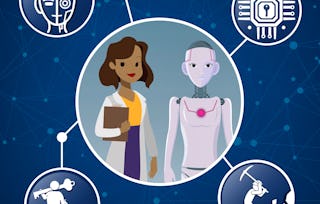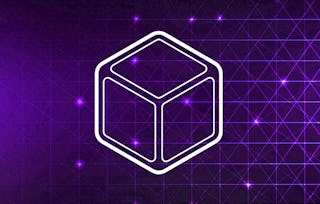Blockchain will bring about profound changes to business, and even to the nature of business itself. This technology will disrupt how enterprises are funded and managed, how they create value, and even how they perform basic functions like marketing and accounting. In this course you will learn how blockchain technology will penetrate into the structures of organizations. You will explore how blockchain will transform the roles of the C-Suite, and how a blockchain can be used to manage and protect intellectual property. You will be able to identify the different layers of the blockchain technology stack, and explain how these affect the governance of blockchain systems. As well, you will be able to identify seven qualities that a region in the world needs in order to attract technology startups and to build a vibrant blockchain ecosystem.

Blockchain and Business

Blockchain and Business
This course is part of Blockchain Revolution Specialization


Instructors: Don Tapscott
22,592 already enrolled
Included with
426 reviews
What you'll learn
Explain how blockchain technology will transform business structures, roles, and functions
Describe seven new blockchain business models
Identify some strategic approaches to managing intellectual property with blockchain technologies
Identify the layers comprising the blockchain technology stack, and describe how each of these affects the governance of a blockchain ecosystem
Skills you'll gain
- Technology Strategies
- Business Leadership
- Organizational Structure
- Data Governance
- Blockchain
- Strategic Leadership
- Intellectual Property
- FinTech
- Governance
- Business Transformation
- Innovation
- New Business Development
- Business Modeling
- Business Strategy
- Corporate Sustainability
- Executive Presence
- Emerging Technologies
- Business Technologies
- Business
- Cyber Governance
Details to know

Add to your LinkedIn profile
See how employees at top companies are mastering in-demand skills

Build your subject-matter expertise
- Learn new concepts from industry experts
- Gain a foundational understanding of a subject or tool
- Develop job-relevant skills with hands-on projects
- Earn a shareable career certificate

There are 6 modules in this course
The corporation represents a pillar of modern capitalism. With the rise of a global peer-to-peer platform for identity, trust, reputation, and transactions, we will be able to re-engineer deep structures of the firm for innovation and shared value creation. In this module, we explore blockchain’s role in decentralizing the enterprise and its implications on the roles and boundaries of the firm.
What's included
13 videos4 readings3 assignments4 discussion prompts
There are countless opportunities for blockchain to disrupt or displace traditional centralized business models. In this module, we explore how blockchain technology can support new business models through the inclusion of native payment systems, reputation systems, uncensorable content, trustless transactions, smart contracts, and autonomous agents.
What's included
15 videos6 readings3 assignments1 discussion prompt
Because blockchain changes the deep structures and architecture of the firm, it will consequently transform our models of management and the roles of the C-Suite. Navigating the balance between blockchain’s hype and its true potential is a key responsibility of an organization’s management team. In this module, you will learn about some of the decisions and changes that business leaders can anticipate when considering how the future of blockchain will unfold within their business.
What's included
11 videos8 readings14 assignments
With companies across sectors seeking to harness the transformative potential of distributed ledger technologies (DLT), the blockchain ecosystem is an exemplar of new models of industry collaboration. Coopetition—the strategy of cooperating with competitors for defined purposes to cultivate a new economic ecosystem that benefits both—has become the new norm. In this module, you will learn what companies are trying to gain from consortia projects, and what industries and competitors need to accomplish to get to a win-win. You will discuss various design options, organizational models, and best practices for consortia projects, and will explore several examples of industry consortia that are at the forefront of the blockchain ecosystem.
What's included
6 videos2 readings4 assignments
Blockchain alone is just a tool. In order for this technology to fulfill its long-term promise, humans must lead. Rather than relying on state-based institutions, blockchain must be primarily self-governed through collaborations of civil society, private sector, government, and stakeholders in non-state networks. In this module, we'll discuss some of the key issues, challenges, trade-offs, and future scenarios related to blockchain regulation. We'll discuss key distinctions between "regulation" and "governance," and explore the idea of blockchain governance networks, including how they can support blockchain stewardship at three levels: The platform level, the application level, and the ecosystem level. As well, you will learn about the conditions that are necessary for a blockchain-based hub of innovation to succeed.
What's included
14 videos4 readings4 assignments
As the digital revolution unfolds, it is driving profound changes in the global economy, labor markets, old institutions, and society as a whole. To realize the potential of the blockchain revolution, we need business leaders to come to the table as responsible and active participants in a new social contract for both their own long-term interests as well as in the interest of a healthy society and economy. In this module, you will explore possible directions for a new social contract—i.e. the agreements, laws, and behaviors that people, companies, civil society, and their governments adhere to. The aim of this module is not to provide a definitive strategy for instituting and enforcing a new social contract, but rather to catalyze investigation, debate, and action.
What's included
12 videos1 reading2 assignments1 peer review1 discussion prompt
Earn a career certificate
Add this credential to your LinkedIn profile, resume, or CV. Share it on social media and in your performance review.
Instructors


Offered by
Explore more from Business Essentials
 Status: Free Trial
Status: Free TrialUniversity of Cape Town
 Status: Free Trial
Status: Free TrialDuke University
 Status: Free Trial
Status: Free Trial Status: Free Trial
Status: Free Trial
Why people choose Coursera for their career

Felipe M.

Jennifer J.

Larry W.

Chaitanya A.
Learner reviews
- 5 stars
77.23%
- 4 stars
16.90%
- 3 stars
3.28%
- 2 stars
1.17%
- 1 star
1.40%
Showing 3 of 426
Reviewed on Aug 7, 2023
Very exciting information for all those looking forward to the fourth industrial revolution.
Reviewed on Jul 3, 2020
Fantastic overview of blockchain technology, how it's being used today, and may be used in the future as well as implications. It is a great prerequisite to building DApps, purchasing coins, etc.
Reviewed on Jun 21, 2019
Online Campus blockchain and business applications and implications of distributed ledger technology good course

Open new doors with Coursera Plus
Unlimited access to 10,000+ world-class courses, hands-on projects, and job-ready certificate programs - all included in your subscription
Advance your career with an online degree
Earn a degree from world-class universities - 100% online
Join over 3,400 global companies that choose Coursera for Business
Upskill your employees to excel in the digital economy
Frequently asked questions
To access the course materials, assignments and to earn a Certificate, you will need to purchase the Certificate experience when you enroll in a course. You can try a Free Trial instead, or apply for Financial Aid. The course may offer 'Full Course, No Certificate' instead. This option lets you see all course materials, submit required assessments, and get a final grade. This also means that you will not be able to purchase a Certificate experience.
When you enroll in the course, you get access to all of the courses in the Specialization, and you earn a certificate when you complete the work. Your electronic Certificate will be added to your Accomplishments page - from there, you can print your Certificate or add it to your LinkedIn profile.
Yes. In select learning programs, you can apply for financial aid or a scholarship if you can’t afford the enrollment fee. If fin aid or scholarship is available for your learning program selection, you’ll find a link to apply on the description page.
More questions
Financial aid available,
¹ Some assignments in this course are AI-graded. For these assignments, your data will be used in accordance with Coursera's Privacy Notice.

